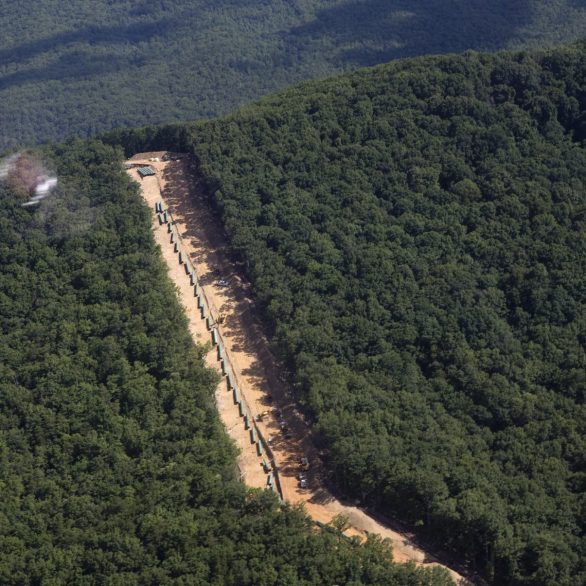
Fourth Circuit upholds key permit for Mountain Valley Pipeline
Construction of the Mountain Valley Pipeline will continue after the Fourth Circuit on Wednesday denied environmental groups’ petition to reverse a key certification.
“All told, we are satisfied that the agencies considered the relevant data and provided a satisfactory explanation for their conclusion,” the 19-page ruling states.
The construction certificate issued in 2021 allows the pipeline to cross over streams and wetlands. The Sierra Club, Appalachian Voices, and others filed a petition for review with the Richmond, Virginia-based appeals court challenging the permit approval, claiming it violates the Clean Water Act.
Based on approval from the Federal Energy Regulatory Commission, Virginia’s Department of Environmental Quality and the State Water Control Board granted the pipeline project a water protection permit that requires the state to certify that water quality standards will be met. The environmentalists argue that trenching hundreds of waterways to build the pipeline does not meet Virginia’s water quality standards.
The natural gas pipeline will span approximately 304 miles from Wetzel County, West Virginia, to Pittsylvania County, Virginia. The portion of the project located within Virginia consists of 107 miles of pipeline and 51 miles of access roads in Giles, Craig, Montgomery, Roanoke, Franklin, and Pittsylvania counties.
U.S. Circuit Judge Stephanie D. Thacker, a Barack Obama appointee, wrote Wednesday’s opinion and concluded that the Virginia agencies’ decision was neither arbitrary nor capricious.
The environmental groups argued the state agencies failed to evaluate alternative crossing locations, verify whether the crossing methods would be the least environmentally damaging practicable alternative, or assess whether the pipeline will comply with Virginia’s narrative water quality standards.
But Thacker found the groups failed to present any evidence indicating that any crossing could be moved without altering the pipeline’s position elsewhere.
“Respondents emphasize that the pipeline is a large, contiguous project, and, as such, changing one stream crossing would alter the pipeline’s sitting in other places,” the ruling states. “Because there is nothing before the court from which we can conclude that the agencies could have changed one crossing without altering FERC’s siting determination, we conclude that the agencies correctly applied Virginia law by approving MVP’s proposed crossing locations.”
Thacker wrote that the case record shows the agencies reviewed feedback about MVP’s proposed crossing methods and ultimately concluded the pipeline company’s proposal was the least environmentally damaging practicable alternative.
“The agency held multiple public meetings where it heard directly from the public, considered nearly 8,000 public comments, addressed several recurring issues raised by the commenters, and provided a final fact sheet detailing its reasons for recommending that the board grant MVP’s application for a VWP Permit,” the judge wrote.
The three-judge panel that heard arguments in January – Thacker plus Chief U.S. Circuit Judge Roger Gregory, a George W. Bush appointee, and U.S. Circuit Judge James Andrew Wynn, another Obama appointee – ultimately disagreed with the accusation that the agencies rubber-stamped MVP’s proposed crossing methods.
“The agencies asked several clarifying questions to ensure they were satisfied that the project minimizes the impact on the environment,” the ruling states.
Virginia law requires the DEQ to individually review each proposed water body crossing with an upstream drainage area of 5 square miles or greater. Despite only 13 of the 236 surface water crossings meeting the threshold necessary to require agency review, the DEQ reviewed all 236 crossings before issuing the permit, according to the ruling.
The judges ruled that the agencies correctly determined the pipeline would comply with the state’s narrative water quality standard, which stipulates that state waters should be free from waste in amounts harmful to human, animal, plant, or aquatic life.
“Because it is clear from the record that DEQ considered a variety of factors in determining that the construction and operation of the pipeline would comply with Virginia’s narrative water quality standard, we conclude that the agencies did not act arbitrarily and capriciously by determining that the pipeline will comply with Virginia’s narrative water quality standard,” Thacker wrote.
Attorneys representing the state and the environmentalists did not respond to requests for comment.
